When and how is New Year celebrated in Germany?
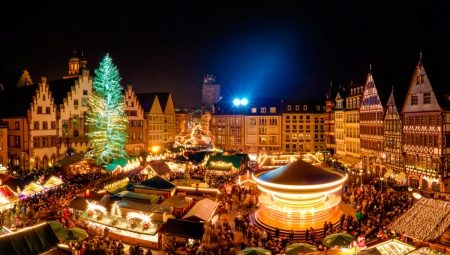
New Year's holidays for many peoples are important and the most significant of the year. Each country has its own characteristics of the celebration of this event, which you should be aware of. Differences in New Year's dates, symbolism, traditions and more are something that can be seen on different continents and in different cultures. Our article is dedicated to celebrating the New Year in Germany.
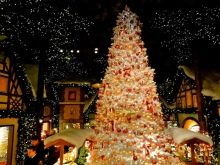
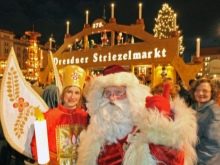
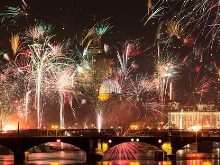
history of the holiday
New Year in Germany, like in many other countries, is a magical and very important holiday. Preparation for it begins long before the main event. Every German cleans up his house and backyard territory, throwing away all unnecessary things.
Preparations for the main winter holiday start on November 11 at 11 o'clock and 11 minutes, when New Year departments open in all stores and specialized New Year fairs begin to work. Until January, the whole country is immersed in a holiday atmosphere with singing street performers, musicians, amusement parks and sweets that can be found everywhere.
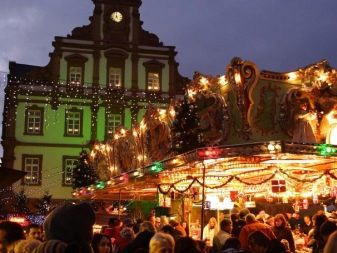
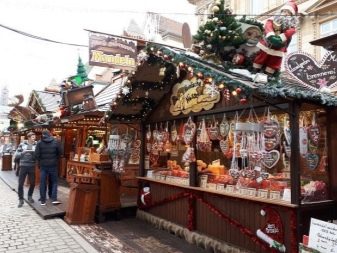
The immediate preparation for the New Year begins a month before the event and is called Advent in the Germans. At this time, you can purchase a special calendar, according to which it is easier and more convenient to count the days before the holiday, in addition, a spruce wreath with four candles is hung in the house. Shortly before Christmas the Germans put tree and decorate it - it is this tradition that Europeans love so much and still remains relevant for most families. Another symbol of the upcoming New Year is poinsettia flowerthat blooms during this period.
December 24 in Germany celebrate Christmas Evewhen believers go to church, and the 25 comes Christmas, and the whole family gathers together at the table and celebrates this bright day. Germans cook fatty foodsbelieving that this is what scares away evil spirits. On December 26, the holiday continues with noisy and merry festivities at fairs. The New Year itself begins from December 31 to January 1, like all Europeans.
In many countries, New Year's festivities are called Sylvester by the name of a priest who died on December 31.
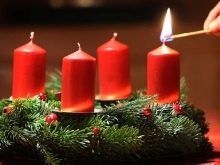
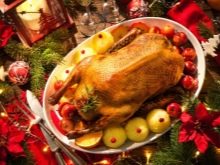
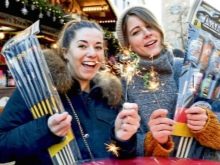
How is it celebrated?
The Germans celebrate New Year's holidays noisily, they believe that this will scare away evil spirits and bring happiness to every home. To create a festive and cheerful atmosphere, people go out into the street with a variety of instruments: lyres, rattles, tambourines that make noise; in addition, fireworks, firecrackers and confetti are launched at 12 am. Throughout the year in Germany, it is forbidden to use fireworks, but this prohibition does not apply on New Year's Eve, and the entire population is delighted to watch colorful flashes in the sky.
The German New Year differs from others in that no one sits at home here, every German goes out and has fun all New Year's Eve. It is easy to guess that the celebration reaches its greatest scope in large metropolitan areas.
In Munich and Berlin, something special is happening, in addition to the huge number of tents with food and drinks, locations with entertainment, there are a number of other places that must be visited.
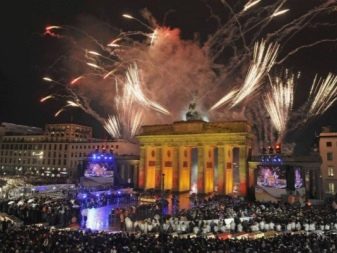
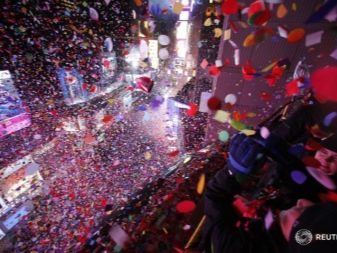
It is worth arriving in Munich in advance, for the New Year holidays, in order to have time to go to fairs and to the main market located on Marienplatz. A central Christmas tree is erected on the main square, next to which all the most interesting takes place during the New Year holidays. For those who have not yet bought gifts for family and friends, you can go to the Olympic Park, where the fair is open until the New Year. Even at the airport, the Germans have an interesting and fun time thanks to the construction of an ice rink and the organization of food zones and entertainment locations.
If you celebrate the New Year in Berlin, then here you can visit three large New Year fairs, watch an interesting program and fireworks on the eve of the holiday. Germans with children celebrate New Year in Kaiser Wilhelm Memorial Church, where more than seventy carousels are installed, there are counters with a variety of food that everyone will like. Special events include ballet "Nutcracker", which is staged for the New Year, as well as various exhibitions and interesting places where Germans and guests of the country rest.
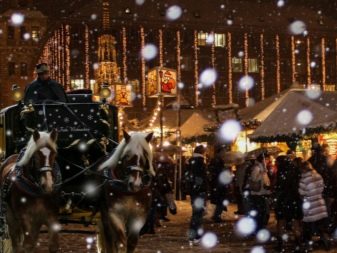
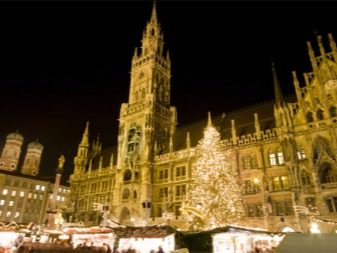
New Year's holidays in Germany are characterized by unbridled fun and joy, pedantic Germans once a year forget about everything and enjoy the holiday. Besides the street festivities, serious preparations for the festivities are also underway at home: a few days before Christmas and New Years, perfect order is being established everywhere, the house is decorated with garlands, fir wreaths and other paraphernalia. Presenting gifts is no less important, therefore, their preparation takes an important place in the life of every German.
In Germany, as in other countries, there is a Santa Claus, only here he is called Weinachtsman.



How do they decorate?
Every hostess in Germany carefully prepares for the New Year holidays. Cleaning an apartment or house is considered a must. The Germans believe that good luck will come to a clean house, so they diligently clean up dust, dirt, throw away everything old and unnecessary. Women are engaged in updating tablecloths, curtains, dishes and much more, which is an indispensable attribute of this event.


Besides order, Germans add elements of festive decor to their homes, fairy-tale characters or any other pictures are painted on windows and doors, which are then effectively highlighted. In private houses, the fireplace is cleaned and cleaned so that on December 6, the day of St. Nicholas, you can safely wait for a special guest, hanging bright socks for him along the mantelpiece.
In preparation for the holiday, not only adults, but also children participate, they are happy to help decorate the Christmas tree, which is considered a sacred tree by the Germans, therefore it is highly respected and beautifully decorated. Also, many families make spruce wreaths and hang them around the house.
A bright New Year's atmosphere is felt in everything that contributes to a wonderful family holiday, which smoothly flows into noisy festivities.

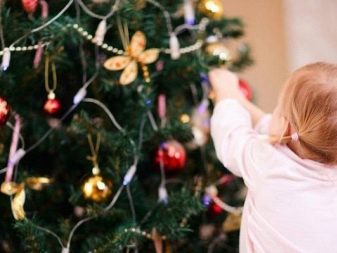
What do they give?
In Germany, most of the gifts are given at Christmas, and on New Years, only children often receive surprises. The process of giving a gift is considered a very important matter, so the Germans pass it on from hand to hand, which helps to strengthen family ties, establish contacts with neighbors and friends. Another feature of gifts is their wrapping, which must be made by hand and will certainly be complemented by a postcard with the best wishes.
The Germans have symbolic New Year gifts, often figurines of piglets, horseshoes, chimney sweeps, clover petals. Many residents of this country prefer to give edible gifts in the form of gingerbread, chocolates and other things that are tasty and pleasant. Parents give adult children books or envelopes with money, but the little ones are the luckiest, they are pampered with whatever they want.



Festive table
For the New Year holidays, the Germans prepare a large number of dishes, the main of which is fish. For them, carp symbolizes a rapidly moving creature that overcomes any obstacles and achieves its goal. Fish scales are a symbol of wealth, which is why many Germans carry them with them in their wallets.
The menu for the holiday can be very diverse, the same fish can be fried, boiled or baked. Another traditional German dish is stewed cabbage with Bavarian sausages or pork... Meat and cheese cuts are very popular; on the table you can see a huge number of varieties of meat, sausages, boiled pork, as well as all kinds of cheese.
Traditional dishes include apples stuffed with nuts and raisins, which also have their sacred meaning. Apples are a symbol of the struggle between good and evil, the shell of the nut and the edible inner part are the symbol of the mystery of life.
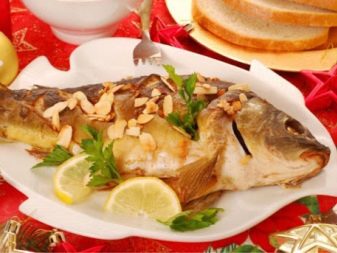
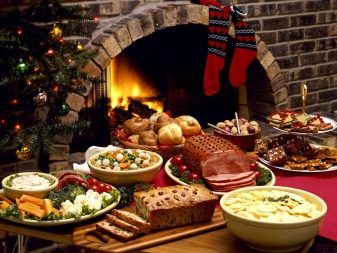
The Germans drink champagne, ale, punch, punch and beer on New Year's Eve. The amount of alcohol consumed reaches impressive proportions. To eat a significant amount of drinks, baked goods are also prepared: all kinds of strudels, donuts, marzipan desserts, pies and pies.
New Year's for the Germans is a real celebration of life, where you can eat deliciously and to your heart's content, have fun and spend time at your own pleasure.
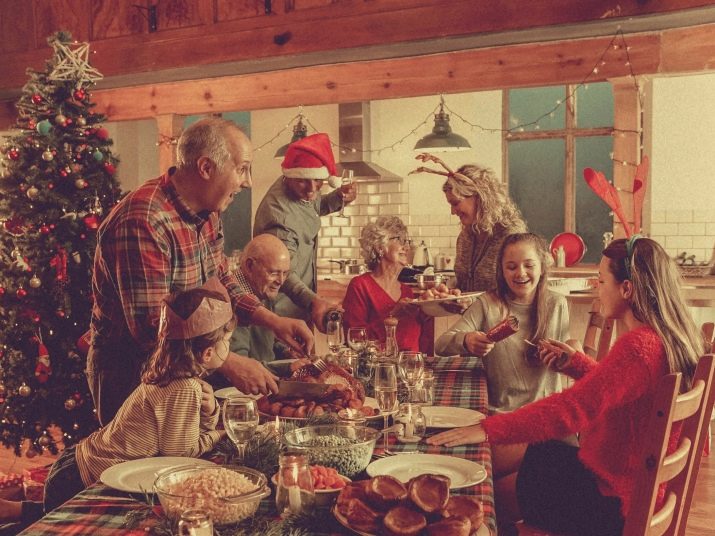
Other customs and traditions
New Year fairs lasts from November to the end of December, which allows you to buy everything you need without standing in lines and having a wide selection of goods for every taste. In supermarkets and on the street, children and adults can meet Weinachtsman, who will congratulate them on the upcoming holidays, and residents themselves give gifts for Christmas to each other.
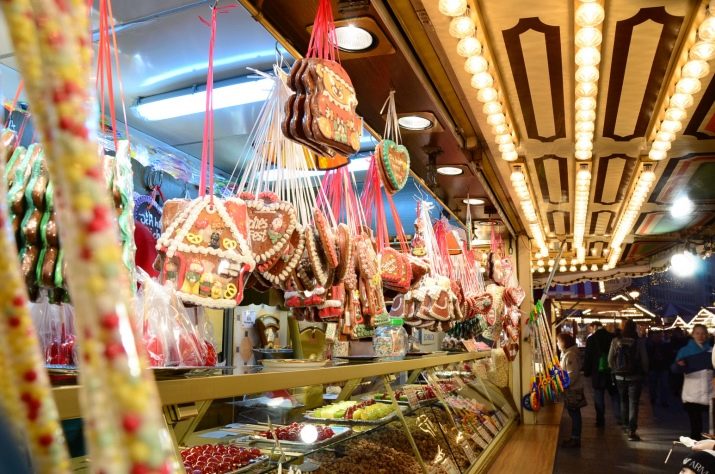
Some of the traditions and customs of this country can be attributed to the peculiarities of the New Year in Germany. Interesting rituals include:
- eating lentil stew before the New Year for success in financial affairs;
- the prohibition of drying things on January 1, otherwise you can invite evil spirits into the house;
- fortune telling with lead, which is melted in a spoon and dipped in ice water, the resulting outlines should have a special meaning;
- "Jumping" into the coming year: all Germans stand on chairs, sofas, stools and, with the 12th stroke of the clock, jump off them, "jumping" into the new year.
The Germans are preparing many dishes, new glassware is being put on the table. They congratulate each other throughout the day, cheerfully celebrate the New Year and believe that the more noise on New Year's Eve, the better and happier the coming year will be.
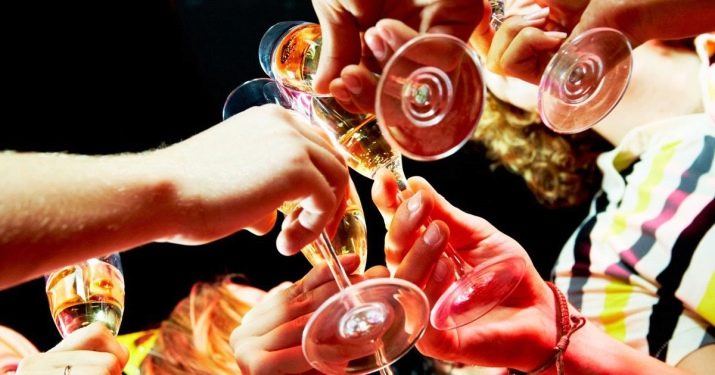
For how New Years are celebrated in Germany, see the next video.








